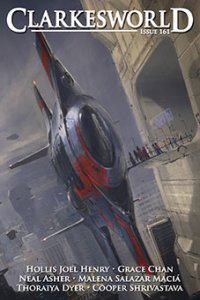Karen Burnham Reviews Short Fiction: Clarkesworld, Lightspeed, Big Echo, and Tor.com
 Clarkesworld 2/20
Clarkesworld 2/20
Lightspeed 2/20
Big Echo 1/20
Tor.com 1/29, 2/5, 2/11, 2/19/20
February’s Clarkesworld starts off strongly with “Outer” by Hollis John Henry. It’s a chilling story of mutants in the Caribbean, the result of some kind of scientific mishap. It hearkens back to Van Vogt’s Slans as we follow one particular mutant who can both feel emotions of those nearby and also snuff out their lifeforces, but this story resonates deeply with Caribbean history. Another particularly strong story is “Mandorla” by Cooper Shrivastava. I love stories where very, very different beings communicate with each other, and here the long-lived Old Plant “talks” with the much shorter-lived and aquatic Kelp, keeping track of their evolution over the course of “generations” (a concept that the tree-like Old Plant has considerable difficulty with). We learn about the history and future of their world, and how each sees threats and opportunities that the other misses. It shifts our natural conception of who has the “long view” in wonderful ways.
Elsewhere in the issue is “The Host“, a new Polity story by Neal Asher, where Ivebek is a killer/smuggler changed by an alien encounter out beyond Polity territory; we learn how and why as his fate takes him to a new planet with a very different lifeform waiting for him. Grace Chan provides a long story about “Jigsaw Children” in a future where it is a social norm that children should be gene spliced and raised collectively. We follow one of these children, Lian, from age nine to adulthood. She first totally supports the status quo that she’s always known, only later coming to question it. I appreciated the nuance that Chan brought to the whole examination. Finally Thoraiya Dyer has a story of a “Generation Gap” in which women in a small all-female society progress through rigidly defined roles as they get older. Our viewpoint is a girl who starts as a Child and progresses to be a Tower. In a society so inflexible, it is easy for things to go wrong, and when she tries to navigate the delicate border disputes with her neighbors, breaking with the policies of the previous Tower, things go off the rails.
Lightspeed in February starts off with a novelette by Brenda Peynado. In the near-ish future tale “How We Burn“, Sequoia and her friends are the product of a strictly enforced one-child policy in a denuded world. Every remaining child has two parents, four grandparents, and eight great-grandparents looking over their shoulders and, in the case of the rebellious Sequoia, letting her know just how very disappointing she is. This is a classic story of teenage rebellion, set in an Anthropocene future where there is even less to hope for than ever before. JT Petty also brings us a story without a lot of hope in “The Gamecocks“. It imagines a very near future where autonomous vehicles completely take over the trucking industry. Hardy is a military veteran turned trucker. He and his wife Leslie Anne had been just squeaking by in their middle-class lifestyle when he is put out of a job, partly thanks to the efforts of his brother’s software company. The story is tightly focused on the couple as their world slowly disintegrates into unpaid bills and the temptations of domestic terrorism against the AI-ruled highways. It’s an all-too plausible scenario.
In the fantasy section of Lightspeed, Kij Johnson brings us a fable of “Noah’s Raven“, imagining how Noah’s Ark may have come together at the last minute, with animals being rounded up and thrown together, without any sense of which ones are true pairs. Bessary (the shortening of a truly wonderful name that Johnson imagines, covering multivalent senses) is thrown in with an older male, Arum, whose mate is left off board. Arum keeps a running dirge for those species that don’t survive the voyage and slowly blink out, one by one. In the end Bessary is sent to scout for land after the ship runs aground but before the waters have truly receded; what she sees and imagines in her flight is considerably darker than the story of the dove and rainbow that I recall from various Sunday school versions. There’s no one better than Johnson for imagining animal intelligences, and this blending of the mythic and the specific is excellently done.
Big Echo starts their 14th issue with a standout story from a newcomer, Carlos Norcia. “We were The Workshop for (a torturer’s) Utopia” tells a near-future story of a society turning towards fascism. The Fractal Workshop is a group of speculative fiction writers who are attempting to resist. We get the stories of two members who are fooled by a convincing informant, and in the last section we get the story of the workshop’s director, totally sidelined and coopted by the regime. It’s a heartbreaking story that casts intense doubt on the political power of art; a useful if sobering perspective.
Elsewhere in the issue, “V/ OI/ D” by Kek-w is a flash length critique of “disruptive technologies” that always end up supporting the same capitalist structures. “Causal Relationship” by Shana Ross imagines a physicist in a disintegrating marriage; while her husband Eric is trying different avenues of counseling, she is turning her attention to time travel. There’s also a reprint of an overlooked John Shirley story, “Meerga“. Originally published in 2013, it rather presciently imagines a paranoid world of drones, VR, and automated weaponry that makes Ryan’s walk down the street to visit his girlfriend potentially deadly. Ryan’s father is doing a study of the meerga, human women who have been genetically engineered to be imbecilic “pets” (i.e. sex slaves). The titular character is one of these women who happens to be born with high-level intelligence; Ryan’s father adopts her and all the characters come in for a share of healing.
Tor.com kicks off February with “St. Valentine, St. Abigail, St. Brigid” by C.L. Polk (2/5/20). This is the gripping story of a girl raised by a woman who commands magical power, at least partly through the bees that she keeps. The girl grows up in a very rich household, but is held apart from almost all her other classmates, including Lucille, whom she has a crush on for years. We see her grow up, come into power of her own, and how that affects the human connections that she has managed to forge. February also brings a new Charlie Jane Anders story, “If You Take My Meaning” (2/11/20). On an alien world, Alyssa seeks to become a human/alien hybrid like one of her lovers. It’s a harrowing transformation that requires a journey to an alien underworld. She and a man, Jeremy, are both seeking the same goal with the alien Gelet. While there is political turmoil in the human world above them, they both come to realize that the stakes are much higher for the aliens with whom they hope to commune.
Garth Nix‘s story at the end of January (1/29/20) continues a series of stories set in the Sherlock Holmes universe with magical intrusions. In “The Case of the Somewhat Mythic Sword” Sir Magnus Holmes and his “keeper” Susan Shrike investigate an odd occurrence beneath a pub where an echo of Arthurian times has appeared. The story itself moves neatly through its paces, but there’s obviously more in store for poor Magnus. Harry Turtledove (who has had a very productive season of short fiction lately) brings us an interesting future in “Manuscript Tradition” (2/19/20), set in 2219. We take a leisurely tour through this future via a day-in-the-life of Dr. Feyrouz Hanafusa, librarian at the Yale rare manuscript collection. In the second half of the story, a mystery rises up as a broadcast from an exoplanet seems to link back to an (in)famous tome in her archives. Forteana is the gift that keeps on giving for a certain set of SF/F writers, and as a once-and-future subscriber to the Fortean Times magazine, I get a chuckle whenever one of their standbys graces a story I’m reading.
Recommended Stories
“If You Take My Meaning”, Charlie Jane Anders (Tor.com 2/11/20)
“Outer”, Hollis Joel Henry (Clarkesworld 2/20)
“We were The Workshop for (a torturer’s) Utopia”, Carlos Norcia (Big Echo #14)
“St. Valentine, St. Abigail, St. Brigid”, C.L. Polk (Tor.com 2/5/20)
“Mandorla”, Cooper Shrivastava (Clarkesworld 2/20)
Karen Burnham is an electromagnetics engineer by way of vocation, and a book reviewer/critic by way of avocation. She has worked on NASA projects including the Dream Chaser spacecraft and currently works in the automotive industry in Michigan. She has reviewed for venues such as Locus Magazine, NYRSF, Strange Horizons, SFSignal.com, and Cascadia Subduction Zone. She has produced podcasts for Locusmag.com and SFSignal.com, especially SF Crossing the Gulf with Karen Lord. Her book on Greg Egan came out from University of Illinois Press in 2014, and she has twice been nominated in the Best Non Fiction category of the British SF Awards.
This review and more like it in the April 2020 issue of Locus.
 While you are here, please take a moment to support Locus with a one-time or recurring donation. We rely on reader donations to keep the magazine and site going, and would like to keep the site paywall free, but WE NEED YOUR FINANCIAL SUPPORT to continue quality coverage of the science fiction and fantasy field.
While you are here, please take a moment to support Locus with a one-time or recurring donation. We rely on reader donations to keep the magazine and site going, and would like to keep the site paywall free, but WE NEED YOUR FINANCIAL SUPPORT to continue quality coverage of the science fiction and fantasy field.






